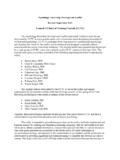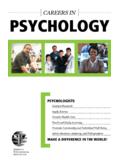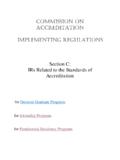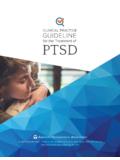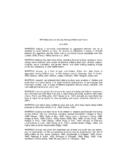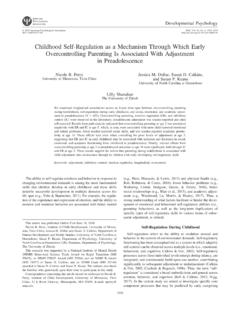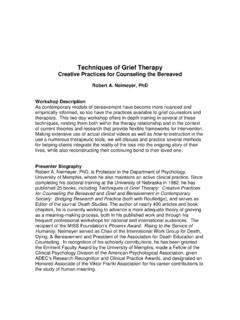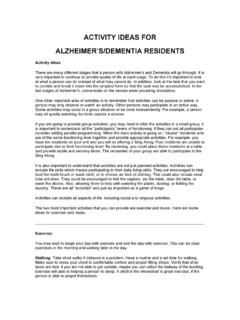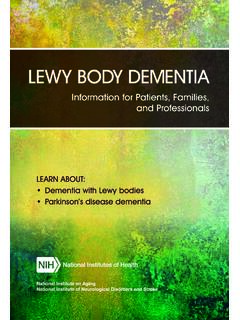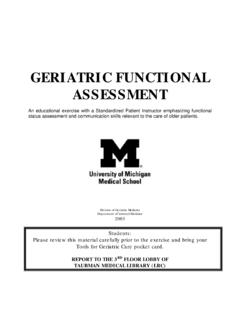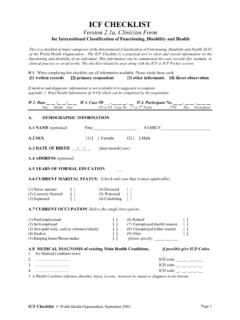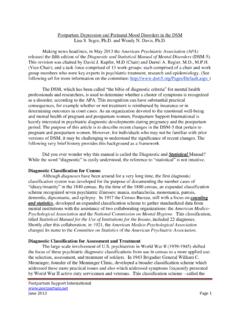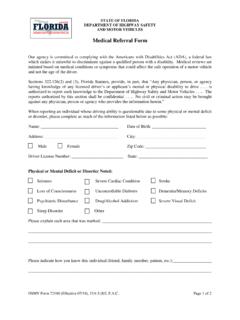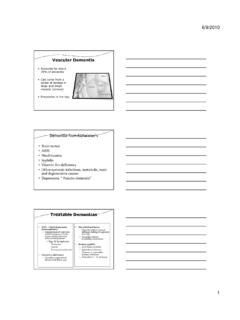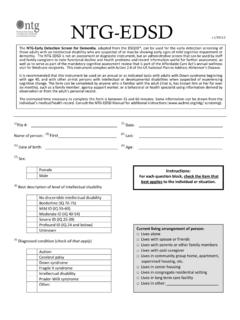Transcription of Life Plan for the Life Span
1 life PLANFOR THE life span Copyright 2018 by the American Psychological Association. This material may be reproduced and distributed without permission provided that acknowledgment is given to the American Psychological Association. This material may not be reprinted, translated, or distributed electronically without prior permission in writing from the publisher. For permission, contact APA, Rights and Permissions, 750 First Street, NE, Washington, DC 20002-4242. The APA Committee on Aging would like to acknowledge the contributions of Victoria H. Bedford, PhD; Neil Charness, PhD; Nancy C. Coleman, MSW, MA; Martha Crowther, PhD; Claudia Espenscheid; Margaret Gatz, PhD; Diane Halpern, PhD; Douglas A. Hershey, PhD; Beth Hudnall Stamm, PhD; Robert Johnson, PhD; Harold G. Koenig, MD; Victor Marshall, PhD; Susan McFadden, PhD; Sara Qualls, PhD; Wendy A. Rogers, PhD; Warner Schaie, PhD; Jan Sinnot, PhD; Harvey Sterns, PhD; Anderson Smith, PhD; Pamela B.
2 Teaster, PhD; Peter Walker, PhD; Susan K. Whitbourne, PhD; Keith Whitfield, PhD; Robert J. Willis, PhD; Sherry L. Willis, PhD; Steven H. Zarit, PhD; and Antonette Zeiss, plan FOR THE life span 1 Ten Questions About AgingTo plan effectively for later life , you ll need to identify your expectations and assumptions about grow-ing older. The following 10 questions will help you focus on aspects of the aging process and what you can do to plan for the future. The issues raised by these questions are discussed in more depth throughout the booklet. 1. At your current age, and given your sex, how long are you likely to live? The older you are, the longer you can expect to live. For instance, a man reaching age 65 today can expect to live, on average, until age A woman turning age 65 today can expect to live, on av-erage, until age And those are just averages. About one out of every four 65-year-olds today will live past age 90, and one out of 10 will live past age 95.
3 A number of factors affect life expec-tancy. To calculate your life expectancy, go to Health and Health Care (pp. 6 13) 2. What do you look forward to about getting older? If you answer this question in a positive way, it means you will be in much better shape to meet both the positive and negative challenges of aging. Individuals with more optimistic self-per-ceptions of aging report better functional health and live longer than those with less optimistic No matter where you are in your life span , you need a life plan . Most of us do not like to think about aging, much less plan ahead for later life . Yet preparation is key to well-being as you grow good news is that you can do specific things to secure a healthy, happy, and financially sound old age. With some foresight, your later years can be healthy, wealthy, and that spirit, this booklet highlights important issues for you to attend to during different stages of your life .
4 It provides links to resources that can help you make your own life plan . We focus on the following five areas: Health and health care Legal and financial matters Work life and retirement Psychological issues Social roles and resources2 AMERICAN PSYCHOLOGICAL ASSOCIATION self-perceptions of aging. Unfortunately, many people focus on the negative aspects of aging, such as joking about having a senior moment or being over the hill. The truth is that most older adults find positive things about getting older. They report high levels of life satisfaction despite often facing societal devaluation. See Psychological Issues (pp. 30 37) and Social Roles and Resources (pp. 38 45)3. As you get older, how can you best take advantage of the experience and wisdom you have accumulated during your life span ? As people get older, their experience and wisdom can make up for losses in other areas, such as reaction times (which may be slower) or memory (there may be working memory difficulties).
5 The best way to take advantage of your lifetime of experience is to view your abilities in a positive light. Take a positive view of what you have to offer and others will, too. See Psychological Issues (pp. 30 37) and Social Roles and Resources (pp. 38 45)4. Are there ways you can maximize your cognitive functions as you age, such as your memory and problem-solving abilities? Research shows that keeping your mind active and engaging in physical exercise is the best way to maintain and maximize your cognitive and memory skills. Having a hobby that engages your brain and body is particularly valuable, whether it involves learning new things, going dancing, reading a book, being a sports or vid-eo game enthusiast, or staying abreast of current events. Staying socially involved also keeps your mind engaged and can help keep your intellectual functions intact.
6 See Health and Health Care (pp. 6 13) and Social Roles and Resources (pp. 38 45) life plan FOR THE life span 35. Is your current living arrangement the best choice for you as you age?Many people find that as they grow older, their houses become difficult to navigate and manage, yet remaining in their home ( aging in place ) may help them feel comfortable and secure. To decide what is best for you, take a careful look at your current housing situation. Are there many stairs? Is it difficult to keep clean? Does it have handicap-accessible or adaptable facilities? Will groceries, health care, and religious services remain accessible to you if your health status changes or you can no longer drive? Before you consider moving, take stock to see whether there are changes you can make in your current home that will allow you to remain there. One comprehensive source of information on this topic can be found at See Work life and Retirement (pp.)
7 22 29)4 AMERICAN PSYCHOLOGICAL ASSOCIATION6. Do you know the legal and financial steps needed to retire? Do you know how to retire or close your practice in a thoughtful way? Retirement does not just happen. It takes careful planning. You can-not simply walk away from your job, even if you are self-employed. Consult with your state professional association, visit your human resources department, or review the helpful resources for retiring professionals in this booklet. See Work life and Retirement (pp. 22 29)7. Will your parents outlive their financial resources? Will you? The financial resources you and your parents will have depend on many factors, including assets, pension plans, Social Security entitle-ment, and any other savings that have been put aside. You can calcu-late your Social Security entitlement and conduct a financial checkup using other resources at Legal and Financial Matters (pp.
8 14 21)8. Does your family know what you would want if you were to have a serious health problem and could not speak for your-self? Do they have the legal right to carry out your wishes? It is important to be able to make your wishes and values clear regarding the care you would like to receive should you become ill. Advance directives, such as living wills or durable power of attorney for health care, provide a formal way to specify who you would want to make decisions for you and what types of decisions you would like made. A good resource is the Toolkit for Health Care Advance Planning, developed by the ABA Commission on Law and Aging and available at Legal and Financial Matters (pp. 14 21) and Work life and Retirement (pp. 22 29) life plan FOR THE life span 59. What services would be available if you became sick, frail, or needy? What services would be available to your spouse, partner, or parent?
9 Many people live in communities that provide services to older adults through senior centers or area agencies on aging. Some services available to older adults include Meals on Wheels, fuel assistance, caregiver support, respite care, and transportation services. Find out what resources are available in your community by checking your local governmental listings or visiting the Eldercare Locator developed by the Administration for Community Living: Social Roles and Resources (pp. 38 45)10. Will Medicare pay for your nursing home care should you need it? Medicare only pays for a part of nursing home care for a very limited time and only if you are discharged from a hospital. Eligibility for Medicaid is based on income, assets, and family size. For more infor-mation about Medicare, check For more information about Medicaid, the primary public funding source for nursing home care, check Legal and Financial Matters (pp.)
10 14 21)H E A LT H AND HEALTH CARELIFE plan FOR THE life span HEALTH AND HEALTH CARE 7 Never Say NeverMany people think there is nothing they can do about aging. However, how you age is partly a function of your lifestyle. Whether you are 46 or 64, it is never too late to benefit from eating well, exercising regu-larly, and maintaining healthy lifestyle an Informed Health ConsumerInformed health consumers learn about the physical changes that occur with normal aging and those that are caused by disease. They educate themselves about how to stay healthy and prevent illness and disability. If they do become ill, they find out about their treatment options and the risks and benefits of is important to know not only how to optimize your personal health but also how to get the health care you need when you need it. The health-care deliv-ery system in the United States is the most complex and confusing system in the world.


